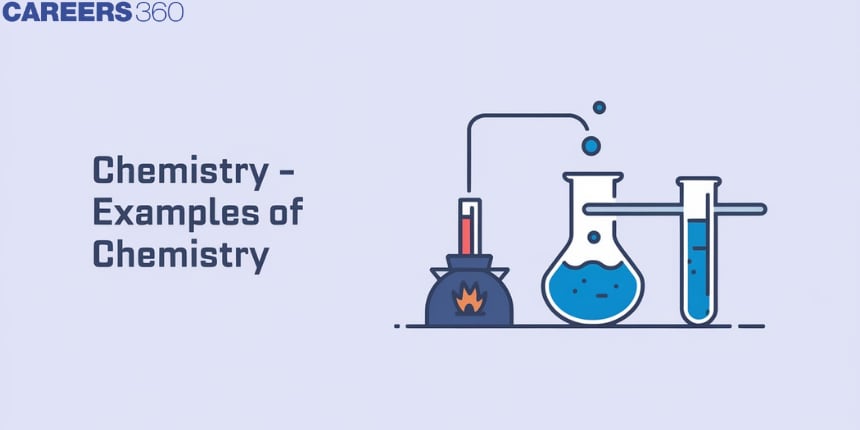Chemistry: Examples Of Chemistry In Everyday Life
Chemistry is a sub-field of the natural sciences that deals with the study of substances and their constituent substances. We also examine the properties of these substances and the reactions they undergo to form new substances. Chemistry focuses primarily on atoms, ions, and molecules, which make up elements and compounds. These chemicals tend to combine with each other with the help of chemical bonds. It is important to note that interactions between matter and energy are also studied in the field of chemistry.
JEE Main 2025: Chemistry Formula | Study Materials | High Scoring Topics | Preparation Guide
JEE Main 2025: Syllabus | Sample Papers | Mock Tests | PYQs | Study Plan 100 Days
NEET 2025: Syllabus | High Scoring Topics | PYQs

Chemistry is the study of the properties, composition, and structure of elements and compounds, as well as how they change and the energy released or absorbed in that change.
Chemistry's Relation To Other Sciences
The natural universe, its structure, and its composition have everything to do. Due to the vastness of the natural world, science has been divided into several disciplines dealing with specific aspects of the universe.
Formal Science: This includes research in areas of language related to formal systems. Logic and mathematics are examples of scientific disciplines that fall into this category.
Natural Sciences: It involves the study of natural phenomena. It is done through experiments. Chemistry, physics, and biology are examples of natural sciences.
The Social Sciences: They are concerned with the study of human societies and human relationships. Examples include psychology and economics. Sociology also falls under this science.
Chemistry can therefore be viewed as a central science whose roots extend to several other sub-fields of science.
Departments Of Chemistry
The five main fields of chemistry are physical chemistry, organic chemistry, inorganic chemistry, analytical chemistry, and biochemistry.
Chemistry of Organic Compounds: Organic chemistry is the branch of chemistry concerned with the scientific study of organic compounds (compounds containing covalently bonded carbon atoms). This branch of chemistry is primarily concerned with the structure and chemical composition of organic compounds, the physical and chemical properties of organic compounds, and the chemical reactions that these compounds undergo.
Inorganic Chemistry: The term "organic" refers to compounds containing carbon atoms. Therefore, the branch of chemistry that deals with the study of compounds other than carbon-hydrogen atoms is called "inorganic chemistry" and uses the principles of physics to understand chemical systems and reactions.
Biochemistry: The branch of science that deals with the study of all life processes, including their regulation within living organisms, is called biochemistry.
Analytical Chemistry: Analytical chemistry involves the separation, identification, and quantification of substances. This includes using classical methods alongside modern methods using scientific instruments.
Chemical Reaction: A chemical reaction is where a bond in a reactant molecule is broken and a new bond is formed in a product molecule to form a new substance.
In addition to these main subjects, there are several special areas of chemistry that deal with interdisciplinary issues. It includes chemistry related to medicines, and materials, nuclear chemistry, chemistry related to the environment, and thermochemistry.
Examples Of Chemistry In Everyday Life
Chemical reactions are happening all around us. Thousands of chemical reactions take place in the human body every day. Every process in the body, from digesting food to muscle movement, involves chemical reactions. Here are some examples of chemistry in everyday human life.
The process of photosynthesis is a chemical reaction that allows plants to convert water, sunlight, and carbon dioxide into glucose and oxygen. This is the most important process, with the help of which the entire food chain is built.
Soaps and detergents used for hygiene purposes use a chemical process called emulsification. Also, they are made by a chemical process called saponification.
The sunscreens that people use to protect themselves from the sun's harmful UV-A and UV-B radiation are also based on chemicals. These lotions and creams are made from a combination of inorganic and organic compounds that filter or block incoming UV rays.
Frequently Asked Questions (FAQs)
Chemistry is a subfield of the natural sciences that deals with the study of substances and their constituent substances. We also examine the properties of these substances and the reactions they undergo to form new substances. Chemistry focuses primarily on atoms, ions, and molecules, which make up elements and compounds. These chemicals tend to combine with each other with the help of chemical bonds. It is important to note that interactions between matter and energy are also studied in the field of chemistry.
The sunscreens that people use to protect themselves from the sun's harmful UV-A and UV-B radiation are also based on chemicals. These lotions and creams are made from a combination of inorganic and organic compounds that filter or block incoming UV rays. This is the example used to show that chemistry is used in everyday life.
The five main fields of chemistry are physical chemistry, organic chemistry, inorganic chemistry, analytical chemistry, and biochemistry.
The different types of chemistry are:
Chemistry of Organic Compounds
Inorganic Chemistry
Biochemistry
Analytical Chemistry
Chemical Reaction
It includes research in areas of language related to formal systems. Logic and mathematics are examples of scientific disciplines that fall into this category.
Also Read
30 Sep'24 10:56 AM
19 Sep'24 11:46 PM
19 Sep'24 11:09 PM
19 Sep'24 11:03 PM
19 Sep'24 10:50 PM
19 Sep'24 07:46 PM
19 Sep'24 07:39 PM
19 Sep'24 07:38 PM
19 Sep'24 07:33 PM
